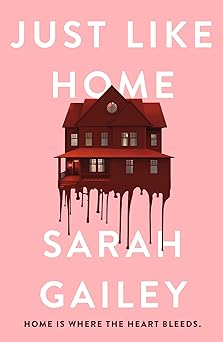More on this book
Community
Kindle Notes & Highlights
The Crowder House clung to the soil the way damp air clings to hot skin.
For something a different daughter and a different mother might have said to each other by now, something that would stitch up the open wound that was the last twelve years.
This was the goldfish tank where she’d grown to the size she would always be, even after her mother gave her away to the world.
Vera breathes through her nose, only through her nose, short shallow breaths that she hopes will be the right kind of quiet. But then she has second thoughts. She’s pretty sure that she usually sleeps with her mouth open. Has the thing under the bed been there for so long that it will recognize the difference between her asleep-breathing and her awake-breathing?
They had nothing to say to each other that hadn’t been said when Vera was a child, nothing that hadn’t been communicated by the years they’d spent as strangers.
There was no point in dwelling on this, on what was and what might have been, on the relationship she and her mother would never have. It was a distraction. There was work to be done here. Best to shake it off and move on.
Being home was pulling something out of her that she didn’t want.
She exhaled and the Crowder House sucked up the air that left her.
So Vera did what she had so much practice doing: she took the hunger and the anger and she pressed them down into the empty aching void inside her where those letters should have gone.
With the door shut, the basement is darker than a closed eye. Vera tells herself that she is not afraid of the dark, but this kind of darkness feels aggressive and smothering, like icewater closing over the top of her head. She isn’t supposed to be here, and that frigid darkness knows it.
Those gaps were smooth, every loose splinter of wood long-since claimed by visitors who had never met Francis. Never spoken to him. Never felt the warmth of his strong hands.
Shame starts to trickle into that empty space like urine down a pant leg, a hot and uncontrollable flood of it that she doesn’t know how to escape.
Maybe they could share milkshakes and talk about the way her mother had always hated her and the way there was love in that hate somewhere. Maybe they could really talk, before Daphne was gone forever. The way Vera had always yearned to talk to her. The way she’d never let herself wish they could talk.
“Now,” she says softly, evenly, her eyes still shut, “you’ll go to your bedroom and stay there until I can stand to be in the same room as you.” She purses her lips for a moment, then continues. “You will not turn me into a woman who strikes her child. I’m a better mother than that.”
In the daylight, when she felt like a grown-up with her own car and her own life and her own morals, Vera knew that the grease wasn’t real—that it was something her father’s mind created, a figment that drove him to kill again and again. But at night, in her bed, with the blue light of her laptop stinging her eyes—and there in that closet, with her father’s gloves and his thermos and a pile of old blankets that had once warmed his lap, too—Vera wasn’t so sure. In the dark, when she was alone, she couldn’t help but wonder what she would have learned if they’d only had more time together. What
...more
But now she knew better. Now, after all these hours in the dark closet, she was certain: the monster in the dining room bed was to blame, had kept her and her father apart for all these years, had stood between her and a true understanding of what was just below the surface of the world.
After a long moment of hesitation, the darkness in the room receded away from her like a tide going out, and the lights flickered on, bright and strident. Vera blinked at the sudden illumination.


